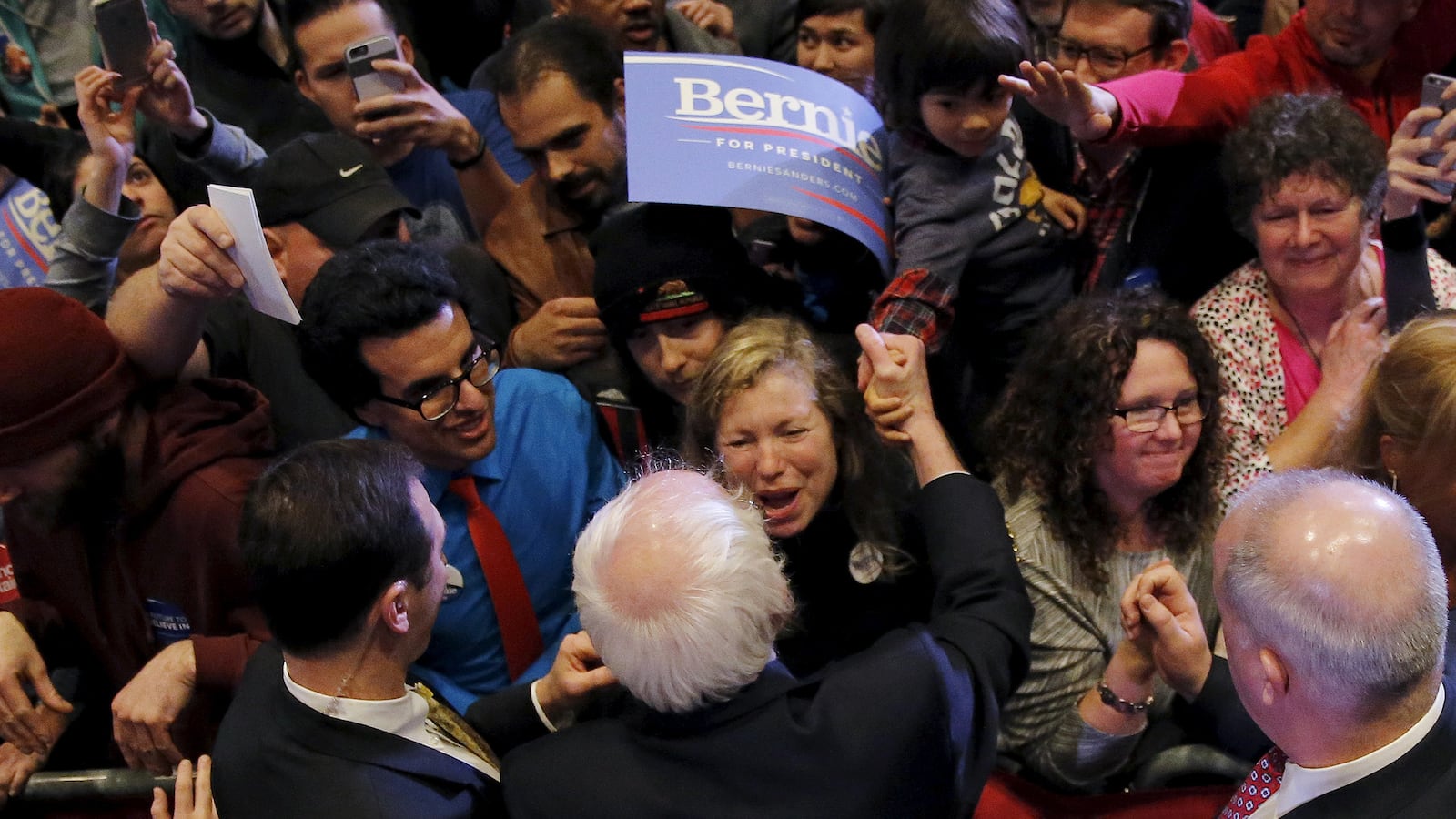Did Republicans take a break from their own hot mess of a presidential race to boost Bernie Sanders’s White House dreams?
Well, no.
American Crossroads—founded by former Bush adviser Karl Rove—and several other conservative-backed super PACs have spent the last month intentionally fueling the Bern, but their zeal has more to do with an effort to weaken Hillary Clinton, whom they still see as the likely Democratic nominee and harder to defeat in the general election.
In the wake of Clinton’s close Nevada win, Crossroads claimed credit for driving her numbers down in favor of Sanders.
“American Crossroads and Bernie Sanders helped Nevada caucus-goers see right through Hillary Clinton’s manufactured zeal on immigration reform after spewing virulent Trump-like rhetoric—and that one-two punch shaved Clinton’s 50-point lead a year ago to a slim, single digit win,” Steven Law, Crossroads CEO and president, said in a statement.
Crossroads is one of several groups that has released ads that have been aimed at branding Sanders as the only true progressive in the race—a strategy the Vermont senator’s campaign also embraces.
“If it helps push the needle so that she loses a state, and she comes out a weakened candidate, then fantastic,” said Ian Prior, communications director for Crossroads.
On Monday, Future 45, a super PAC reportedly backed by hedge fund billionaire Paul Singer, launched the latest in its own series of ads that seem to defend Sanders. The new spot, titled “Living History”—no doubt a play on the title of Clinton’s 2003 autobiography—accuses the former secretary of state of using similar tactics to tear down Sanders as were used in 2008 against then-Sen. Barack Obama.
“The ad is about the Clintons’ character and their pattern of deceitful actions,” said Brian O. Walsh, president of Future 45. “The fact that they’re up to the same old tricks again is just one more reminder they’ll do anything to win an election and can’t be trusted by anyone.”
If the ad helps Sanders, well, that would just be a happy byproduct.
Prior to Clinton’s win in the Silver State, Future 45 made an ad buy on Feb. 16 for a spot that “opposed” Sanders, according to Federal Election Commission.
But the ad, while critical of Sanders’s positions, is cast in a way that could appeal to Democrats.
It hit the senator for “a $15 minimum wage that hurts small businesses” and “taxes on banks and corporations that will kill jobs across the country”—two issues the progressive community has supported.
Another group, Ending Spending Action Fund, backed by Ameritrade founder Joe Ricketts, has spent about $774,321 on ads opposing Sanders, according to an analysis by the Sunlight Foundation.
But these too seem to have a double meaning.
In Iowa, the group’s “Too Liberal” spot goes through Sanders’s promises of free college, universal health care, and other left-wing dreams, but aside from the “concerned lady” narrator voice, it’s not clear whether the ad is negative until the very end.
The Sanders campaign didn’t respond to a request for comment on the Republican generosity—but that doesn’t mean it is complicit.
Still, the Clinton campaign has cried foul, noting that Sanders’s supporters have been echoing Republican attacks on Clinton and that he certainly has not been rejecting the ads.
Sen. Claire McCaskill, who used a similar ploy successfully, even called out Ricketts on Twitter.
“I see you Joe Ricketts. And I know exactly what you’re up to. #ToddAkin Don’t fall for it Iowa Dems,” she tweeted.
In 2012, McCaskill’s campaign famously ran ads seemingly opposing Rep. Todd Akin as the most conservative candidate in the race.
Akin, who later would say in cases of “legitimate rape” women couldn’t become pregnant, was the more defeatable candidate—and McCaskill’s ads helped him win the primary.
Several gaffes later, he lost and McCaskill held on to her vulnerable Senate seat.
The success of other similar, perhaps less subtle, schemes are debatable.
In 2008, Rush Limbaugh launched what he dubbed “Operation Chaos,” which encouraged Republicans to vote in open primaries for Clinton in order to weaken Obama and prolong the Democratic fight.
In 2004, Republicans in several states helped Ralph Nader, then the Green Party candidate, in the hope that he would drive votes away from then-Democratic nominee Sen. John Kerry.
In the end, Nader received 1 percent of the vote, and Kerry lost to President George W. Bush 48 to 51 percent.






